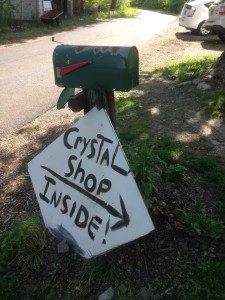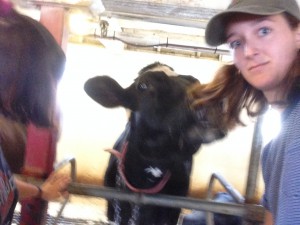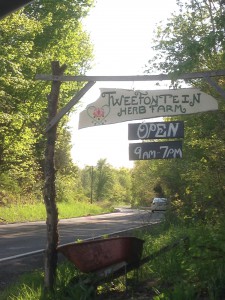 Two weeks ago, my sister, Juliette and I went on a hike in the Catskills. On our way home, as we were heading towards New Paltz, we passed a sign for “Tweefontein Herb Farm.” I had previously known about the other farm stands along the road, and was planning on stopping at one of them for my independent fieldtrip, but I was intrigued by the herb farm and pulled in. Up a narrow dirt road we came across a little house. It looked more like someone’s residence than a farm, except that it was surrounded by herb gardens and had herbs and streamers hanging form the eaves.
Two weeks ago, my sister, Juliette and I went on a hike in the Catskills. On our way home, as we were heading towards New Paltz, we passed a sign for “Tweefontein Herb Farm.” I had previously known about the other farm stands along the road, and was planning on stopping at one of them for my independent fieldtrip, but I was intrigued by the herb farm and pulled in. Up a narrow dirt road we came across a little house. It looked more like someone’s residence than a farm, except that it was surrounded by herb gardens and had herbs and streamers hanging form the eaves.
On the porch, a young man and woman, both barefoot, beckoned us inside. They led us to their small shop, which was filled with herbs and incense. The store also sells crystals, jewelry, hangings, perfumes, and thrifted clothes. Their best seller however is their tea, which they make from their own natural herbs. Originally, one of the women had owned a crystal shop in New Paltz, but she joined forces with the herb farm and they now sell their goods together. Their goods range from $1 items, such as sprigs of herbs or tiny amethysts, to much more expensive items of jewelry or perfume.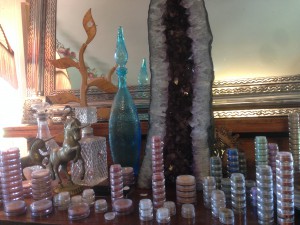
The Tweefontein Herb Farm is a much larger operation than I imaged. After speaking with the man and woman we had met on our way in, we learned that the farm sells at all the major farmers markets in New York, including the Union Square farmers market. They say they have a loyal following, especially for their tea. When I asked if they sold much near by, the man explained that they occasionally sell in New Paltz, but that they don’t have much of a community customer base. I wasn’t particularly surprised by this, especially given what we’d learned in class about the pull of New York business and the hidden nature of their little farm.
The farm is all organic and was created from an old homestead, which originally had been a dairy farm. In the 1980s, the Tweefontein Farm became a member of the New York City Greenmarket and has been one ever since. The farm grows herbs and vegetables and makes added value goods, such as tea and herbal medicines.
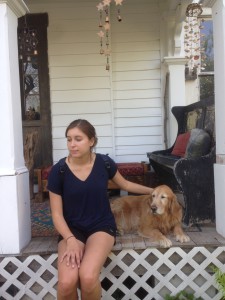 The two young people we met offered to pick us some fresh herbs, since they said that most of their herbs haven’t bloomed yet (it’s not quite the season yet). My sister bought some crystals and we made our way back out into the world. It felt as if we had walked out of a dream, and our clothes still carried the smell of the incense from inside. Outside we petted their two resident golden retrievers and waved goodbye.
The two young people we met offered to pick us some fresh herbs, since they said that most of their herbs haven’t bloomed yet (it’s not quite the season yet). My sister bought some crystals and we made our way back out into the world. It felt as if we had walked out of a dream, and our clothes still carried the smell of the incense from inside. Outside we petted their two resident golden retrievers and waved goodbye.
